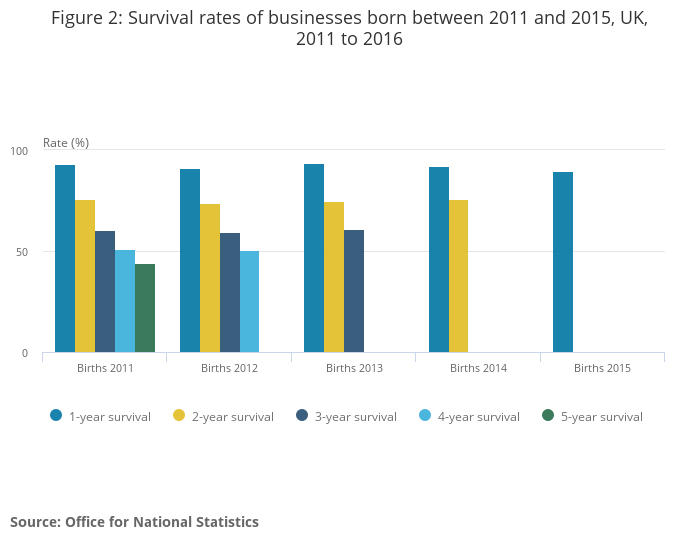Businesses don't run themselves!
Colin Taylor • July 30, 2019
How local authority trading companies can increase the chance of survival.
Although official (ONS) statistics show that around 90% of SMEs survive their first year in business, this survival rate falls to less than 50% after four years. How you increase the chances of survival is no different for local authority owned trading companies.
Well, that's the bad news up front and centre, but it's not all doom and gloom. All start-up businesses face a similar set of challenges and those that survive and prosper are the ones that respond in the most effective way. So what are some of the most common causes of early stage business failure?
- No plan. Writing a business case is one thing (usually what you need to do to get the go-ahead to launch the business) but turning this into a business plan that provides an operational 'handbook' for running the business is an essential next step.
- Failure to understand customers. Not just who they are, but where to find them, how to reach them, what to tell them and, most importantly, how to get them to buy.
- Lack of cost control. Income generation is one thing, but making sure that you are operating cost-efficiently is the key to generating the profits that will create a long-term future.
- Being reactive. Waiting for the market (and customers) to come to you is not a viable strategy and not recognising change in technology, competition and consumer behaviour can threaten longevity.
- Poor management. The most important aspect of running a business is knowing where it is at every moment. Understanding what's going on in finance, marketing, operations and sales is the only way to understand what is going wrong and what is going right.
Are local authority trading companies any different?
The fundamental answer to this question is 'No'. LATCOs are not different and shouldn't be. It's true that the process of establishing a trading company requires some specific thinking (for example, around governance arrangements, accountability and scrutiny), but the core operation of the company has to be carried out on pure commercial terms. The Directors of a LATCO have a legal duty to act in the best interests of the company and need to exercise discipline in making sure this happens. I've even heard the director of a LATCO interrupt a Board meeting to say "if I just put on my Council Chief Exec hat for a minute"!
Successful entrepreneurs will tell you that keeping costs under control is a critical factor in their success. It's widely recognised that the cost base of a LATCO can often make them inherently uncompetitive. This can certainly be true, but it's not a reason to strive to bring costs down and monitor constantly for any unnecessary increases. And if, as is often the case, it is not viable for the LATCO to be the cheapest in the market, it needs to leverage its strengths (including brand reputation, quality of service, expertise) to create a compelling value proposition.
Customers come first
Of course, defining the proposition is only half the equation. The other half, and the two are sides of the same coin, is understanding the customers. The business case should have established in robust detail that a market exists for the company and should have established the potential size of that market and what the LATCO might reasonably expect to gain in terms of market share. However, making this happen in 'real life' is the key to building a sustainable business. The company has to reach out to customers and sell to them. And once it's done that, it needs to do it again.... and again....
Make sure you 'run the business'
All of this requires a single-minded commercial focus that needs to be maintained on a daily basis. It is only active commercial management that will ensure that someone wakes up every morning thinking "what do I need to do today to make this company a success?". It's easy to understand how officers get caught up in council business and only come back to thinking about the LATCO every so often. As the call on the time of senior officers is relentless, this needs be recognised in an effective management structure that allows the company to operate in an agile and proactive way. Market opportunities and customer problems can present themselves at any time and neither can generally wait until next week to be addressed.
Many local authorities has set up trading companies, run them successfully and operate them profitably. However, many invest considerable time, energy and money in creating the business case for a LATCO and in setting up the legal entity they need, only to fail to drive the company forward to commercial success. I'm often surprised by how many councils have set up LATCOs that are sitting on the shelf and stagnating.
One part of the solution to this conundrum can be to bring in additional external expertise and capacity. There's a lot of ground to cover in getting a LATCO up and running as an active business and some skills around business management, marketing and sales that councils, understandably, may not have within their own workforce. And, taking the long term view, if external assistance is used to build internal capacity, then the door is open to creating a sustainable commercial model.

Over the last few months, a number of our local authority clients have been talking to me about how delivering commercial development joins up with their wider transformation agenda. They have been reflecting on the idea that the two things are part of the same journey. And they are, in most cases, saying that both transformation and commercial development work requires people in similar roles to maintain innovation and momentum. Catalysts . I've probably heard the word 'disruptive' once too often, but there clearly is a role for someone to shake things up, take a different view and ask some challenging questions. However, this has to be done in a strategic context, not just for the sake of doing it. I am frequently asked by Chief Execs to take a step back and look at a service from a more holistic, whole-Council perspective. The key is to do this with some idea of where you want to get too. After all, if all you do is knock away the foundations, things fall over. Marshals . I think back to when my son was a teenager and was competing in cycling road races every weekend. The marshals who were positioned around the course (sometimes several miles long) were critical to making sure all the riders were safe and went the right way, as well as stopping motorists crossing the route at the wrong time. Developing a commercial initiative in a local authority is not much different and requires a degree of objectivity to make sure that everyone follows the agreed route. Referees . Getting everyone to play nicely and focussed on the corporate objectives can be one of the biggest challenges. Even if the marshals are in place, disagreements can break out over all sorts of things - budgets, resources, office space etc, etc. An independent voice that can help weigh up competing (and sometimes conflicting) perspectives can be a valuable tool. Deliverers . Doing the hard yards that take a commercial initiative from business case to trading in the market is almost always more challenging than anticipated. It usually takes longer, is more complex and requires more work than anybody expects. Sometimes my role is focussed on maintaining clarity and adherence to the agreed roadmap. Sometimes it is more fundamentally about adding another pair of hands to get specific things done (eg: drafting and agreeing the Shareholder Agreement or s etting up a si mple, but effective, way of tracking prospects and conversion rates. Many years of experience in successful commercial businesses has shown me that, even when these roles are not reflected in people's job titles, it is essential that someone is performing the functions. And with many local authority staff fully occupied with the 'day job' these roles are too important (critical) to be what gets done if there's some spare time (which there hardly really is!).

